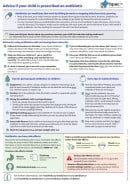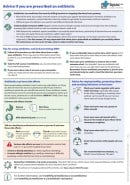You can now add Healthify as a preferred source on Google. Click here to see us when you search Google.
Nitrofurantoin
Sounds like 'night-roh-few-ran-to-in'
Key points about nitrofurantoin
- Nitrofurantoin is an antibiotic used to treat and prevent urinary tract infections.
- Nitrofurantoin is also called Nifuran® or Macrobid®.
- Find out how to take it safely and the possible side effects.

Nitrofurantoin is an antibiotic used to treat and prevent infections of the urinary tract (UTIs), such as bladder infections. It works by killing or stopping the growth of the bugs that cause the infection. For people who get urinary tract infections often, nitrofurantoin can be used to prevent infections. Read more about urinary tract infections in men, women, pregnancy and children.
In Aotearoa New Zealand, nitrofurantoin is available as:
- Nifuran® tablets (50 mg and 100 mg).
- Macrobid® modified release capsules (100 mg).
Yes, some pharmacists will be able to sell Macrobid capsules for the treatment of UTIs.
- Macrobid is available without a prescription to women 16 to 65 years of age, who are not pregnant and don't have any other complicating factors.
- Only pharmacists who have completed additional training can supply Macrobid capsules.
- They will need to ask questions to make sure it's the best option for you and will need to record your name and address.
Always take nitrofurantoin exactly as your healthcare provider has told you. The pharmacy label on your medicine will tell you how much to take, how often to take it, and any special instructions.
The dose of nitrofurantoin you take depends on whether it's to treat or prevent a urinary tract infection, your age, and how bad the infection is.
Macrobid capsules
- Take your capsules with food.
- Take your dose every 12 hours, in the morning and the evening, eg, take it at 8am and 8pm.
- Swallow the capsule whole with a glass of water, don't crush it or chew it.
Nifuran tablets
- Take Nifuran tablets with food or milk.
- Space your doses evenly throughout the day. For example, if you're taking Nifuran 50 mg tablets 4 times a day, take your tablets in the morning (with breakfast), at around midday (with lunch), late in the afternoon and at bedtime. Ideally, these times should be about 4 hours apart (eg, 8 am, midday, 4 pm, 8 pm).
- If you're taking the tablets once a day, take your dose at bedtime.
Missed dose: If you forget to take your dose, take it as soon as you remember. But if it's nearly time for your next dose, just take the next dose at the usual time. Don't take a double dose to make up for a forgotten dose.
Finish the course: If you're taking nitrofurantoin for the treatment of an infection, it's best to take the antibiotic for the exact number of days your doctor has told you to. Don't stop taking it, even if you feel your infection has cleared up.
Here are some things to know when you're taking nitrofurantoin. Other things may be important as well, so ask your healthcare provider what you should know about.
- Taking other medicines: Nitrofurantoin interacts with some medicines, eg, antacids such as Quick-Eze, herbal supplements and rongoā Māori, so check with your doctor or pharmacist before starting nitrofurantoin and before starting any new products. Nitrofurantoin can also interact with Ural which is used to relieve the pain and burning of a UTI.
- Nitrofurantoin can cause serious lung problems: Let your doctor know if you have a cough, chest pain, shortness of breath or trouble breathing.
Like all medicines nitrofurantoin can cause side effects, although not everyone gets them. If you're concerned about any symptoms you think might be related to your medicine, talk to your healthcare provider. The following information offers some guidance but doesn't include all possible side effects.
Common side effects
Tell your healthcare provider if these side effects bother you.
- Nausea (feeling sick), sore tummy, feeling bloated, gas in the tummy: Try taking your nitrofurantoin with food.
- Dark yellow or brown urine: It's not harmful. Your pee will return to its usual colour after you've completed the course of medicine.
Tell your healthcare provider immediately or phone Healthline free on 0800 611 116 if these occur
- Cough, chest pain, shortness of breath.
- Signs of problems with your liver, such as yellowing of the skin or eyes, dark urine, pain in the tummy, pale or grey-coloured poo, itching or pain and swelling in your joints.
- Signs of problems with your lungs, such as cough, chest pain, shortness of breath and trouble breathing, joint or muscle pain, fever (high temperature) and chills: Nitrofurantoin can cause lung problems. This may occur within the first month of treatment or after long-term use of nitrofurantoin. Nitrofurantoin should not be taken for longer than 6 months for this reason.
Phone 111 for an ambulance or go to your nearest accident and emergency (A&E) clinic if these occur
- Signs of an allergic reaction such as itchy skin, and rash, swollen lips or tongue, problems breathing, like a tight chest or shortness of breath.
Read more about medicines and side effects and reporting a reaction you think might be a side effect.
Nitrofurantoin(external link) NZ Formulary
Nifuran(external link) Medsafe Consumer Information Sheet, NZ
Brochures
5 questions to ask about your medications(external link) Health Quality and Safety Commission, NZ, 2019 English(external link), te reo Māori(external link)
Medicines and side effects [PDF, 91 KB] Healthify He Puna Waiora, NZ
Advice if your child is prescribed an antibiotic [PDF, 98 KB] BPAC, NZ
Advice if you are prescribed an antibiotic [PDF, 107 KB] BPAC, NZ
References
- Nitrofurantoin(external link) NZ Formulary
- Medicine-induced interstitial lung disease(external link) Medsafe Prescriber Update 45(4): 76–79
- Nitrofurantoin first for urinary tract infections(external link) He Ako Hiringa, NZ, 2023
- Antibiotics: choices for common infections(external link) BPAC, NZ, 2017
- Nitrofurantoin – not suitable in renal impairment(external link) Medsafe Prescriber Update 2015;36(4):51–52
- Nitrofurantoin – do the benefits outweigh the risks long-term?(external link) Medsafe Prescriber Update 2012;33(2):17–18
- Nifuran(external link) Medsafe datasheet, NZ
- Short-term nitrofurantoin use can cause hepatic reactions(external link) Medsafe, NZ, 2025
Brochures

Advice if your child is prescribed an antibiotic
BPAC, NZ, 2024

Medicines and side effects
Healthify He Puna Waiora, NZ, 2024
Credits: Sandra Ponen, Pharmacist, Healthify He Puna Waiora. Healthify is brought to you by Health Navigator Charitable Trust.
Reviewed by: Angela Lambie, Pharmacist, Auckland
Last reviewed:
Page last updated:






